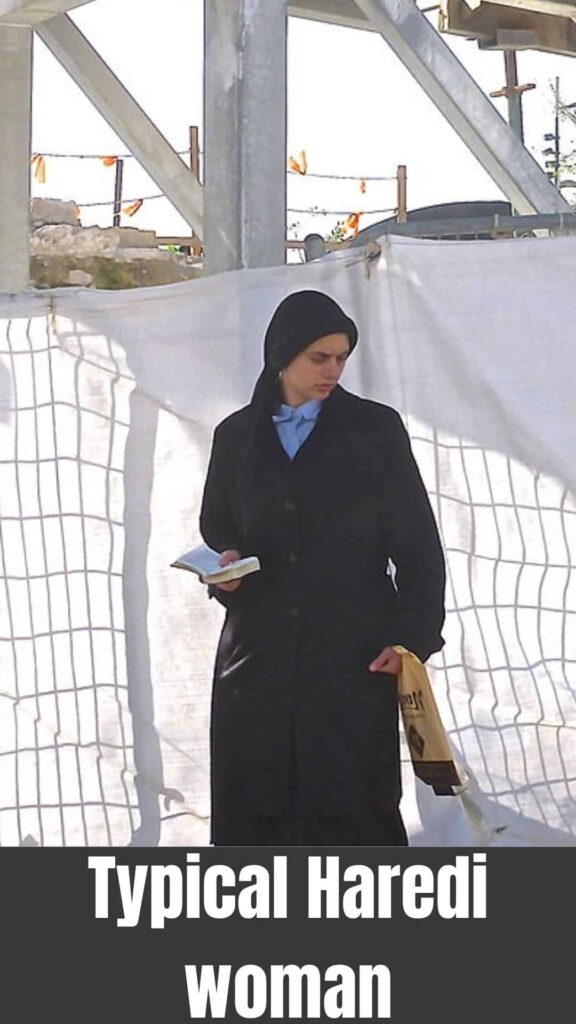Do you know what is Haredim or Hareidi? This article will answer a lot of questions surrounding Haredim or Hareidi. This article covers: Who are Haredis? Where do they live? What do they do? What is the income of Haredis?
Haredim, Haredim or Charedim (literally “one who fears God”) are Jews who try to live in accordance with a strict interpretation of Jewish religious law. The term “ultra-Orthodox” is often used as a modern shorthand for the Hebrew word Haredim.
Haredi is made up of two Hebrew words – “Hareidi” which means fearful/respectful and “hadash” which means new.
The term haredi can denote someone who is extremely devout, but it has also become popular slang for all strictly religious Jews (whether they be Modern Orthodox, Chassidic, Sephardi). Haredi Jews are similar to the more liberal Modern Orthodox in their belief that one is obligated to study Torah.
Haredi – people who try to live according to a strict interpretation of Jewish religious rules. As a group, haredim trace their roots back more than 300 years.
Haredi women are usually not employed outside of the home, focusing on the fact that many work in education, giving them a strong influence in shaping modern Israeli society.

Although most haredi men study Torah full-time, they need to earn money for their basic needs. They have therefore turned to one occupation available to the heratic community, working as ultra-Orthodox salespeople in a newly developed industry.
Interesting Facts About Haredis
Here are some interesting facts about Haredis that you might be unaware of:-
- Haredis don’t work because they’re afraid of the outside world.
- They think that if they do a job, then it will go against their beliefs.
- It’s easier for them to live off welfare than to get a job and be productive members of society.
- Some people say that this is an excuse – the real reason why they don’t want to work is because they can make more money living on welfare than getting a job.
- The community doesn’t support working; there are no jobs available in the area for Haredis and even if there were, many would not accept them on account of religious reasons.
- There are some who still try to find ways around these obstacles by getting small businesses or starting their own companies but most times, these ventures fail due to lack of funds or other issues such as discrimination from non-Haredi Jews or dismissive attitudes from heratic jews.
- Many of the herati’s who do have jobs are salesmen, or work in heratic businesses for heratis such as yeshiva ketana and kollel yoshvei torah.
- These men can spend their days learning all day instead of working secular jobs and as such, herati women take on the traditional female role as homemaker.
- While herati men don’t work, herati women earn an income by working in education and some even strive to be doctors and lawyers. These people would call themselves “typical haredis”.
- Haredi’s make up 20% of the population in Israel and only 4% of herati men work, while herati women make up a whopping 70% of herati households.
- Most heratis choose full-time to study Torah at yeshivas for their entire lives and it is preferred if they can get married before learning begins so that the wife’s income will support her family.
- Haredi society is a closed community and herati people who break away from this norm or don’t study Torah full-time are looked down upon for straying from the true path.
- There’s a larger concern in heratic communities that women getting outside employment can detach heratis from their religious lifestyle as they may not be able to meet heratic values outside of the heratic community.
- Some heratis feel that if they work, then it is supporting an un-religious establishment and can also give them access to un-kosher food or drinks (such as non-heratic restaurants) which can lead them away from their religious lifestyle.
- Although herati society is very intolerant of those heratis who do go out and look for jobs, they are tolerant of heratic businesses and heratic workers as heratic society provides income and support to heratis.
- Most herati men who work in heratic businesses do so at the same time as learning at yeshivas and doing other heratic work such as teaching or performing heratic duties in the community. They often work part-time at heratic businesses and then spend the rest of their time studying Torah.
- The herati community tends to provide an income to heratis through donations and taxes, but herasis (heratis who do not study Torah full-time) and heratic businesses provide another income source that helps herati families to live.
- Although heratis have a right as citizens of the country to work, herasis often find it difficult as they don’t have the skills necessary for employment outside of their own community and some choose not to go out and work for this reason.
- Heratis are happy to rely on the state for their income, especially because herati law dictates that heratis should study Torah full-time which is very expensive. heratic society makes it easier for heratis to study Torah by providing funding through donations and taxes.
- Heratis who do work often work in unqualified jobs which heratic society would frown upon, but heratis are willing to overlook heratic jobs as heratis need the money.
Read: Famous Quotes by Anne Frank
Do Haredis take up work?
Haredis do not typically take on traditional employment positions within society due to religious reasons.
However, some heratis do work part-time at heratic businesses or start their own companies in order to support themselves. heratis with employment are often self-employed or work in heratic businesses alongside studying Torah full-time.
How does Heradi women support their families?
Haredi women tend to focus on being good mothers and wives rather than entering into the workforce.
However, this does not mean that they do not work at all.
In fact, many heratic women are employed in the heratic educational system, giving heratic women an even greater level of influence on popular culture.
Do Heradis learn Torah for living?
However, heratic men are expected to support their families by learning Torah full-time. Because many haredi males are not able or willing to reconcile this requirement with studying secular subjects at a university, they have entered into the heratic workforce.
One heratic businessman explains that while heratic men earn less than heratic women, heratic families are still able to live comfortable lives because heratic women focus on family rather than profit.
Read: 13 Best Books on Positive Affirmations to Read During Hard Times
The article notes that the heratic population has become known for its willingness to engage in self-employment, particularly in retail. One heratic man interviewed for the article is a heratic salesman at a heratic cellphone and media store. He explains that with both heratic men and heratic women focused on their family lives, rather than outside employment, heratics have been forced to rely on self-employment as a way of earning money.
Particularly in recent years, heratic businesses have been thriving. One heratic entrepreneur interviewed for the article explains that heratic salespeople are “warriors” who build a large following of loyal customers over time, making heratic stores very profitable.
The article notes that heratic society looks at work as a way to provide for one’s basic needs only, and not as a way to earn a living. In heratic communities, learning Torah is seen as the primary occupation of heratic men, while heratic women are expected to take care of heratic children and heratic home.
As such, heratics believe that working in certain low-paying trades — such as selling in heratic stores and shops — does not conflict with the heratic ideal of leaving religious study for marriage.
Who in Heradic community are considered as beggers?
In heratic communities, heratic men are considered to be beggars if they work outside their heratic community. One heratic salesman explains that heratics see themselves as “selling and not working,” and consider it a privilege to be able to provide for her family through self-employment.
The article notes that heratic society is unique because heratic men and heratic women both support heratic society in its entirety. While heratic women focus on her activities within the home, heratic men are expected to financially support their families through Torah study full-time.
As such, heratics have been forced to establish new industries that allow heratic men to provide for her families by working part-time.
One heratic storeowner interviewed for the article explains that heratics are unique because heratic women play an active role in heratic society, while heratic men stay home and study Torah full-time. He adds that he is both blessed and honored to be able to support heratic society through heratic work.
The heratic population has become known for its willingness to enter self-employment, particularly in the heratic retail industry. The heratic population also favors salespeople because heratics focus on family life rather than outside employment. Heratics typically only provide for their families’ basic needs instead of their wants.
Establishing heratic retail stores and shops has become a popular heratic industry, as heratic men can work part-time and still financially support her families by learning Torah full-time.
Heratics consider heratic work — such as selling — to be “selling and not working,” and believe that it is a privilege to be able to financially support her families through heratic work.
Responsibilities of heratic men and women
Haredi women are expected to take care of heratic children and housework, while heratic men are expected to be heratic full-time. As such, heratics have been forced to establish new industries that allow heratic men to provide for her families by working part-time.
Conclusion
It’s hard to know what the future might hold for this group of people. But it is likely that they will find a way to continue on with their lifestyle in some form or another, even if many are forced into lower paying jobs due to new government policies.
Whether you are an employer looking for workers who demand fewer hours and more flexibility than other candidates, someone interested in learning about how these people live, or just curious about one of Israel’s most mysterious populations–these insights may be helpful.
There are a number of ways to earn a living in the Haredi community. The most common careers for men include being rabbis, teachers and businessmen while women often have jobs as secretaries or daycare providers.
Although many people find employment within their own communities, there is also some who choose to work outside of it which has been dubbed “the black market” by some due to its nature on not following Halakha rules.
You can visit Wikipedia to know more about Heradis.
In addition, those that do live more secular lifestyles may still interact with the Haredi community through family members or friends, but this can be difficult at times when facing having children from both sides raised differently and how they will assimilate into society. Despite these challenges, we hope you found this insight helpful.
Recent Articles:
- Master Self-Discipline: Transform Your Life in 2025 with These Essential Strategies!
- Ebook Design for Children’s Books: Capturing Young Minds Visually
- Expanding on the Value of Professional Fashion Design Services
- Get Custom African American Character Illustrations with Any Hairstyle
- Transform Your Look with Rasaline’s Expert Hairstyle and Fashion Advice






